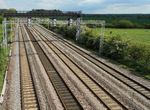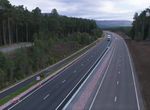Vote For Rail Climate emergency Green recovery Rail first - Friends of the Far North Line - The Friends of the Far ...
←
→
Page content transcription
If your browser does not render page correctly, please read the page content below
We Expect You to
Think Big…
When the results are in after 6 May you are hoping to be a
Holyrood MSP. At this time of rebuilding and recovery you can
help change the future of transport in Scotland. No longer can we
afford to pretend that things can carry on as before. It is time for a
rebalancing of priorities.
Rail is by far the most sustainable way to transport people and
freight. This is not news, but the decision to think big and embrace
the opportunity would be.
On this page we give an example of just how far rail has been
allowed to fall behind. In the 1960s and 70s many believed rail
travel was outdated and no longer needed - how wrong they have
turned out to be!
A critical onward connection for travellers on the Caithness-
Inverness ‘Far North Line’ – and the Inverness-Perth ‘Highland
Main Line’ – is the link from Perth to Edinburgh.
• The direct route between the cities was
closed in 1970 to release land for the
M90 - inconceivable now.
• The result? It was quicker by train in
1895 than it is today.
• The line could be reopened for around
£1.5bn and would bring the cities
around 35 minutes closer,
• or the proposed Forth Tunnel could be
built, giving massive benefits to
travellers from the Central Belt
northwards.1895
Quickest journey: 1hr 05mins
• Quickest journey: 1hr 15mins
• Average time: 1hr 22.4mins
2021
We strongly recommend that you read Rail For All *. This
comprehensive look at the whole rail network in Scotland,
published in January 2021, shows how reports should be written.
No wasted words, just a thorough look at what needs to be done.
FoFNL is apolitical. It doesn’t matter that Rail For All was
commissioned by a political party; that is not the point. It deserves
to be read by all Holyrood candidates and, once elected, acted
upon.
* http://www.fofnl.org.uk/archives/Rail-For-All.pdfRail Recovery We are at the beginning of a process which needs a radical change in the Scottish Government’s transport priorities. The Climate Emergency requires an acknowledgement that the current plans are not sustainable. • All intercity routes must be fully double-tracked and electrified • Reduce Highlands to Edinburgh journey time by either building the Forth Tunnel or reopening the Kinross direct route • Ensure access for longer, greener freight trains by eliminating severe speed restrictions and increasing track capacity on the Far North Line • Maintain rapid development of alternative power sources for unelectrified rural routes • Finalise suitable design for trains on the tourist lines, ensuring maximum comfort and storage space and unobstructed windows • Substantial modal shift is essential - make rail transport for passengers and freight as attractive as possible and legislate as required to ensure this happens • Reopen stations where there is sufficient population and develop Demand Responsive Transport facilities to link communities into the rail system
Around £3bn buys this, Which in railway terms is this, which the Climate Emergency has Great, but not needed on the Highland Main made redundant. Line. Perth to Inverness by rail This is what we need - essential, and is currently provided by a much better use of the money. this, with a few passing places.
Shift to Rail The purpose of this publication is to alert prospective, as well as existing, MSPs to the need to completely reconsider Scottish transport priorities. The points FoFNL is making here are from the Highlands perspective, however the general message is for the whole of Scotland’s Railway. Can we really continue to place trunk road development ahead of rail infrastructure investment? HISTORY In 2008 the then First Minister made a promise that the Highland Main Line, which is the main artery from the Highlands to the Central Belt, would see investment of £54.5m. This was to enable the journey time from Inverness to Edinburgh to be reduced to around 2hrs 45mins, a reduction of 35 minutes. It was to be achieved by extending the double-track section out of Inverness by 4 miles (leaving 77 miles of single track), reopening two passing loops and upgrading the line from Perth to Ladybank in Fife. The First Minister stated that “Railways must at least compete with the roads." This was promised to take place by 2012. In the event it did not happen. PRESENT £57m has recently been spent to improve signalling and two of the passing loops. This, in combination with more powerful trains, has enabled a mere 10 minute reduction in journey time. After 2008 the decision was taken to dual the single carriageway sections of the A9 between Perth and Inverness, at a probable cost today of around £5,000m. A similar situation exists on the other single-track main line, from Inverness to Aberdeen. £330m has been spent on Phase 1 of improvements, which includes the doubling of 16 miles at the Aberdeen end of the route. The remaining 92 miles of single track are still a major problem for passengers and freight travelling on the rest of the line, yet at the same time the decision has been taken to convert the A96 to dual-carriageway throughout, at a cost today of
around £5,000m. To spell this out for the Highlands: road improvements total £10,000m; rail improvements to date total £387m. A Climate Emergency was declared by the Scottish Government in 2019. This changes the entire prospect for transport policy and we need to think much more in terms of collective responsibility. FUTURE It is important to understand from the outset that electric cars, buses and lorries cannot approach the carbon-economy of rail vehicles. There must be very significant modal shift to rail in the very near future. Transport Scotland is well aware of what's needed, but it requires instruction from the Scottish Government to proceed. This will be the job of the MSPs in the 2021-26 Session. The key to transport policy from now on is to ensure that all the busy main lines are double-track, and to proceed with their electrification as quickly as possible. This is the only way to bring freight and passenger traffic to the railway at the levels needed to tackle the Climate Emergency. All trains will be electric. By far the most efficient way to provide the power is through overhead wiring; the alternatives are battery and hydrogen power. Inevitably some lines away from the intercity routes will require bi-mode trains. However, it is important to consider the extra cost of bi-mode stock and to plan ahead to make sure that money is not wasted by making apparent savings on overhead electrification. New rolling stock will be needed and it is essential that it has a very high standard of comfort and excellent on-board facilities, only these will persuade people to shift from their cars. To further enforce modal shift, legislation may be required to reflect the actual cost of moving freight in Heavy Goods Vehicles. Besides producing excess CO₂, the impact of HGVs on society in terms of deaths and injuries and damage to the road infrastructure itself needs to be tackled. We have a short timeframe for this programme of rail improvement, so streamlining the currently expensive and time-consuming appraisal and investment processes is essential. Once the election is over, work towards the shift from road to rail must begin urgently. Now is the time to Vote For Rail!
More Information: Ian Budd, Convener, Friends of the Far North Line - ian.budd@fofnl.org.uk Photo Credits: Front cover: Empty stock for the 2020 timber trial train heading north on the HML - Arran Aird We Expect You to Think Big… : North British Railway train in Princes Street Gardens 1898 - Dr. Tice F. Budden ScotRail Inter7City service, approaching Newburgh - Graeme Blair Back cover: [Top] LNER Azuma passing a ScotRail Inter7City on the short double-track section of the HML near Inverness. [Bottom] Stobart container train on the HML - Sandy Colley
You can also read



























































